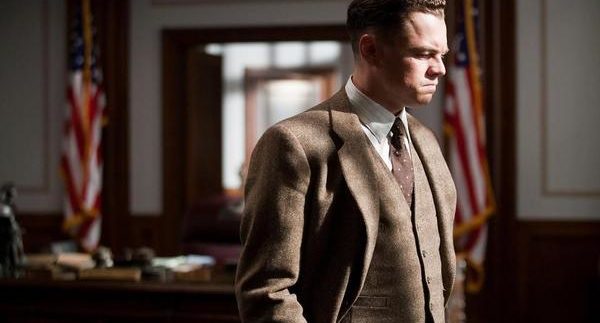-
Armie HammerLeonardo DiCaprio...
-
Drama
-
Clint Eastwood
-
In 1 Cinema
Yasmin Shehab

J. Edgar is the story of the FBI chief’s career from his start as an
overenthusiastic loner to the head of the most powerful law enforcement agency
in America. It shows how he took the FBI from a laughingstock into the powerful institution
that it is today despite the media painting him as an
antisocial, single-minded recluse. Making things worse were allegations surrounding his sexual orientation in relation to his best
friend and assistant director of the FBI, Clyde Tolson (Hammer).
The film is told mainly in flashbacks and its basic structure has an old
Hoover dictating his life to various young typists. This is one of the poorer examples of flashback
use in a film. They’re very confusing and the constant change of supporting
characters are really hard to keep track of, especially as they’re mostly guys
clad in similarly dark suits.
The film is interesting in that in addition to being about Hoover and
the FBI’s rise to prominence, it’s also about how power warps the mind and how
delusions of grandeur can become on par with reality in one’s mind. Everything
you’d taken for granted as Hoover was narrating the story is shattered once we
see it from Tolson’s perspective towards the end. We discover beyond a doubt
that this person who’d wanted so badly to have people see him as a hero, had
actually been a corrupt, power-hungry politician.
Another very prominent topic that is touched upon is Hoover’s complete refusal
of anything against the status quo. He spent his life fighting against
communism, turning his crusade into a national cause. Later on, Martin Luther
King became the object of his scorn and his new mission. The film makes a
compelling case for this intolerance being related to his feelings of self-loathing and his inability to come to terms with his sexuality.
The film’s emotional core comes from Hoover’s inability to come to terms with being homosexual in an intolerant
society. And while Hoover’s internal battle is conveyed strongly enough due to DiCaprio’s acting skills, the same can’t be said about his
relationship with Tolson. The film takes the ridiculous stereotype that gay men
are overly preoccupied with fashion and runs with it to the extreme.
As a decade-spanning film that has the same actors portraying both the
young and old versions of the characters, the aging makeup is integral to their
performances. It’s pretty inconsistent and their youthful voices sound
ridiculous coming from mature faces Thankfully, this doesn’t hinder the fact
that DiCaprio does a great job in showing Hoover’s nuances and managing to
create a portrait that is appropriately ambiguous, neither deifying the man nor
demonizing him.
J. Edgar has a lot going for it but at the end of the day it’s long and
confusing. The way the transitions in time were handled is really poor and ends
up putting a real damper on a movie with a truly fascinating story to tell.
Eccentrics make for good movie material and Hoover was more than just slightly
unhinged. It’s a shame that the movie wasn’t able to make the most of
that.
Write your review
recommended
 Arts & Culture
Arts & Culture
The Coptic Museum: The History of Egypt to the Tunes of Psalms of David
arts & culture cairo museums +4 Health & Fitness
Health & Fitness
Egyptians in the 2024 Summer Olympics
Egyptians in the Olympics Olympics +1 City Life
City Life
Weekend Guide: Bazar by Sasson, Memo, The Cadillacs, Heya Bazaar, Dou, Nesma Herky & More
Concerts The Weekend Guide +2 Arts & Culture
Arts & Culture

